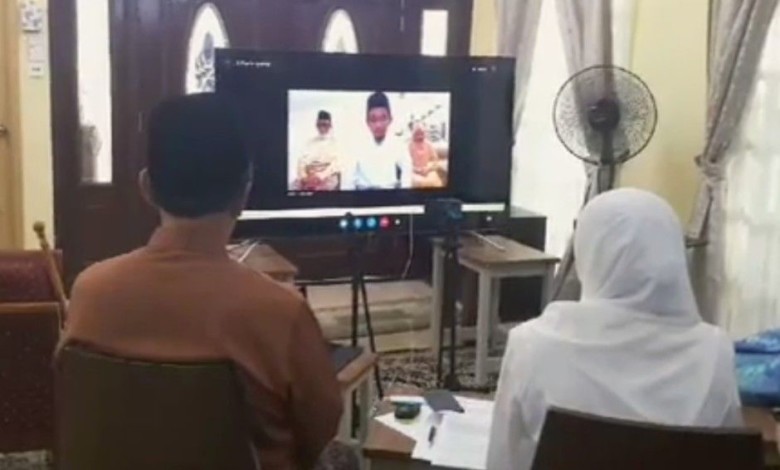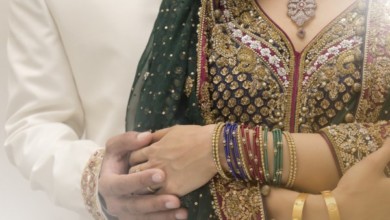Islamic Perspectives on Virtual Nikkah

Technology is evolving rapidly, and with it has come ease in the way we communicate and deal with various issues. Through social messaging Apps like WhatsApp, Skye, Telegram, Facebook, Google Meet and Zoom among others, people in communities thrown far apart to meet and make relationships.
While Islam encourages the use of technology and any other advancements to the benefit of oneself without crossing the limits of Islam, its usage in the implementation of some Islamic rituals has generated debate.
One such controversial aspect of Islam is contracting marriage virtually, where the geographical distance between the man and woman is bridged by the use of technology. It is used in cases where parties are in distant places and a physical meeting is costly. As Hanifah Masaba writes, the concept of virtual nikkah was extensively discussed by Dr Abdul Hafiz Walusimbi, a Sharia (Islamic Law) expert in the latest episode of his weekly Fiqh of Marriage (Nikkah) sessions.
Although traditional scholars didn’t address the subject of the virtual contraction of marriage, they laid a foundation for such advancements, argues Sheikh Dr Abdul Hafiz Walusimbi. Citing
Surat-Al’Anam 6:38 where Allah proclaims that He left out nothing in the Quran, Dr Walusimbi argued that it is an assurance to Muslims that there are answers in the Quran on whatever subject there is. While some social, economic or political issues are directly addressed, others are tackled circuitously by implication.
Contracts in Islam are reduced to writing in the presence of witnesses. In fact, the longest verse of the Quran found in the second Chapter, Surat Al-Baqara talks about contracts. Marriage too is a contract, and hence, scholars say, a man can write his proposal and send it to a woman and she responds to the same in writing. However, Dr Walusimbi says that such a proposal should be done in the presence of an agent who receives the proposal, delivers it to the woman and gets approval.
He cites teachings from the Hanafi school of thought saying that when a person living in the far East concludes a marriage with a woman in the far West, and then the one in the far west produces a child after six months, the parentage is established with the husband. This means that when the two people contract a marriage through an agent, it is valid, and the Islamic teaching that a child born to a married woman belongs to her husband applies.
Scholars have categorized virtual Marriages into two, by air (audio only) and through visual platforms such as Zoom, Google Meet and Skype.
PHONE CALL MARRIAGE
Scholars from the Islamic Fiqh Academy, a platform that unites Sharia scholars from different parts of the world to discuss contemporary issues have differing opinions on contracting such a marriage. The majority of the scholars say, Nikkah is too serious and sensitive a matter to be concluded by a mere phone call. Their argument is that making Nikkah require a contractual meeting and that the proposal and response of acceptance should be communicated without interruption something they say, can’t be realized through a phone call. Emphasis for them is on the consistency of the message transmission to rule out any interruption between the proposal and the response or acceptance.
“I find this, the strongest reason why they find the phone call conclusion of Nikkah hard. They say that there is a possibility of impersonation and that it opens room for misrepresentation. If such a Nikkah must be done, both parties must have agents,” said Dr Walusimbi.
However, a minority decision by scholars such as Wahbatu Zuhairi who opined that Nikkah can be concluded with a phone call validate the arrangement. Their explanation is that, if the person proposing marriage sent his agent to the lady and the agent delivers the letter and she accepts the proposal in the presence of two witnesses who must have heard both the message delivered through an agent and the lady’s response then the Nikkah is valid.
To this, Dr Walusimbi adds that the person giving away the lady for marriage (father or guardian) should also be witness to the proposal and acceptance and that the session should be concluded in one sitting.
“The phone call must go directly to the lady and the acceptance is given immediately. Any disconnection between the proposal and acceptance invalidates the process of Nikah. The names of the proposer and the lady should be clearly mentioned for clear identification,” he emphasized but added, “Any virtual marriage should be done only in situations of necessity, otherwise the seriousness or commitment of the couple to marriage could be cast in doubt.”
Zoom, Skype
Dr Walusimbi says that such a marriage is also allowed but under certain conditions. For instance, the parties should ensure that the rightful people are involved to avoid cases of impersonation, the lady must cover her face with a veil commonly known as Niqab or Sitra, the witnesses and her family with whom they appear for the meeting should assure the proposing man that this is the right woman he is contracting the marriage with. The assurance should however be by word of mouth and never cross the limits of Islam.
He also adds that there should be no interruptions in communication. And if it does especially at the point when the man and woman are exchanging the proposal and acceptance, it should be repeated.
“if for instance the man makes his proposal and the network is interrupted, upon restoration, the woman just doesn’t go ahead to express her acceptance of the proposal, the man should propose again. This is because the man could have changed his mind,” explained Dr Walusimbi emphasizing, there should be no room for error. The lady’s parent or guardian should be able to see and hear the proceedings promptly.
Although contracting marriage virtually is permitted, as explained above, this process is not void of challenges. For instance, if such a marriage is entered, and six months later the woman gives birth, the baby is taken to be for the man. This is whether or not the couple is known to have met physically or not. Remember the Islamic ruling is that whoever child a wife gives birth to belongs to her husband unless he openly (before a Qadhi) disowns the child and pronounces that his wife had a sexual relationship outside marriage. He further cautions that for a person to conduct their Nikkah virtually, they should ensure that they are content with the person they intend to marry.





